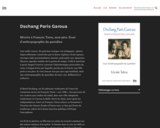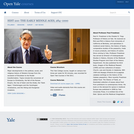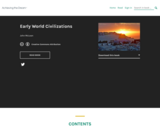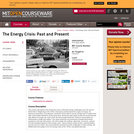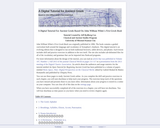
John William White's First Greek Book was originally published in 1896. The book contains a guided curriculum built around the language and vocabulary of Xenophon’s Anabasis. This digital tutorial is an evolving edition that is designed to run on both traditional browsers, tablet devices, and phones. Each lesson includes drill and practice exercises in addition to the text itself. The site also includes tab-delimited files for all of the vocabulary and grammar that can be imported into flashcard programs.
For more information about the design of the tutorial, you can read an article that was published in Volume 107, Number 1, Fall 2013 of the journal Classical World on pages 111-117 or a presentation from the 2013 meeting of the Digital Classics Association. An article about the audiences and usage statistics for the tutorial entitled An Open Tutorial for Beginning Ancient Greek has been published in a volume of papers entitled Word, Space, Time: Digital Perspectives on the Classical World. edited by Gabriel Bodard & Matteo Romanello and published by Ubiquity Press.
You can use these pages to study Ancient Greek online. As you complete the drill and practice exercises in each chapter, you will earn drachmas to help track your progress. The exercises keep track of the questions you have missed and presents those to you more often. Information about your progress is stored in a cookie on your computer. You can clear all of this data on the settings page.
When you have successfully completed all of the exercises in a chapter, you will have ten drachmas. You will lose drachmas as time passes so you know when you need to review chapters again.
- Subject:
- Ancient History
- Arts and Humanities
- History
- Languages
- Material Type:
- Textbook
- Author:
- Jeff Rydberg-Cox
- Date Added:
- 11/01/2018


